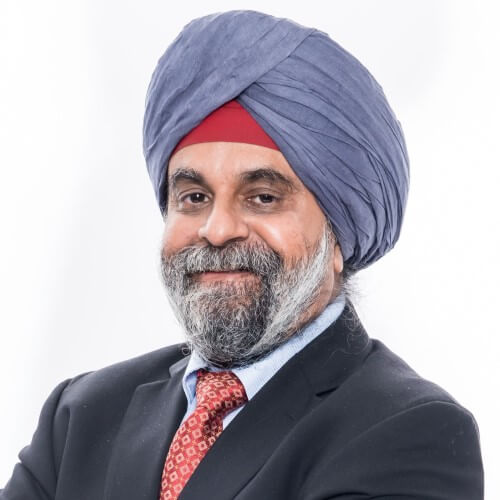Transforming Knowledge into Entrepreneurial Impact
The blog post discusses the importance of entrepreneurship in driving economic growth and innovation. It includes insights from Inderjit Singh, a multinational company leader, on the necessity of entrepreneurship in Singapore's evolving economy. Singh emphasises the need for fostering local companies for future economic growth and sustainability. Additionally, it outlines how the SMU Master of Science in Entrepreneurship and Innovation programme equips individuals with the skills and mindset needed to succeed in the entrepreneurial landscape.
There is no denying that entrepreneurship is the lifeblood of the economy. New businesses are constantly springing up, bringing with them fresh ideas, novel products, and new services. In fact, SMEs are expected to add 55,000 new and upgraded jobs in the next decade, according to Singapore Minister for Sustainability and the Environment Grace Fu.
But entrepreneurship isn’t just about creating jobs; it’s also about generating new wealth. Entrepreneurs are always looking for ways to improve upon existing products and services, and their innovation helps to drive economic growth. What’s more, entrepreneurship fosters a sense of competition that spurs other businesses to do better. Simply put, without entrepreneurs, the economy would stagnate.
As such, we speak with multi-national company leader, serial entrepreneur, former Member of Parliament, and educator Inderjit Singh about the ways in which entrepreneurship is vital to the economy – and how the SMU Master of Science in Entrepreneurship and Innovation (MEI) programme can make a positive impact on the economy through their graduates’ entrepreneurial activities.
Starting up in a volatile economy
As an entrepreneur, it is imperative to be aware of the current state of the economy and be prepared to seize opportunities when they arise. While there may be greater risks to launching a start-up in times of volatility, there also tends to be opportunities for creatively minded founders.
For example, during social and economic adversity such as the drawn-out war in Ukraine or current energy crisis, there may be windows of opportunity for entrepreneurs who can provide supply chain solutions or analytics services that identify ways in which to conserve energy usage by organisations.
Moreover, global disruptions have also shaken Singapore’s status as a business hub for multinational companies, resulting in a need for growth in local businesses to sustain an economy that is equitable and sustainable.

Singapore’s past economic development model has been reliant on industrial expansion driven by multinational companies (MNCs), notes Mr Singh. The city-state has a long and successful history of hosting MNCs – a result of the country’s world-class infrastructure, educated and highly skilled manpower and reliable international transportation links. Although this has enabled Singapore to remain competitive amongst other cities in Asia and beyond, other metropolitan locations are becoming increasingly attractive as they build similar strengths in today’s disruptive climate.
“We therefore have to focus on creating our own homegrown companies that will become the future MNCs of Singapore that will drive the future economy of Singapore,” explains Mr Singh, who has founded multiple companies including semi-conductor unicorn United Test and Assembly Centre.
“We have to focus on entrepreneurship as a key driver of the future innovation-driven economy.”
As the global economy faces increasing uncertainty, it is becoming ever more important for countries to focus on establishing a strong entrepreneurial culture. Entrepreneurship not only helps countries become more prosperous and productive, but also encourages innovation as well as job creation. With the right environment and policies in place, entrepreneurship can play an essential role in driving economic growth and stability.
Nurturing an entrepreneurial mindset
In the world of business, possessing a truly entrepreneurial mindset is no longer an optional extra – it has become an attitude that everyone needs to cultivate for success. Being able to think outside the box in resourceful and inventive ways can set any individual apart from their peers.
“We have to stand out from the crowd if we want to succeed,” remarks Mr Singh.
“Thinking and doing things like an entrepreneur can help us differentiate. Throughout my life, whether in school, in the military, in politics, working for MNCs or starting my own companies, I have remained the same person – thinking like an entrepreneur.”

"Taking risks is one of the traits of entrepreneurs."
Inderjit Singh
CEO of Solstar International Pte Ltd
In the ever-evolving global economy, entrepreneurs and innovators stand as agents of change. Through their creativity and vision, they create new possibilities for economic growth and technological advancement.
For ambitious professionals looking to harness this potential, a well-rounded education in entrepreneurship and innovation can provide invaluable insight into how these forces drive business success. By pursuing a degree that focuses on these disciplines, individuals can equip themselves with the skills needed to make informed decisions about investments, identify areas ripe for disruption in their industries, develop powerful strategies to guide their projects forward – and ultimately help set them up for success down the road.
“We have a unique opportunity to work with young and aspiring people to equip them with the right mindset, and then with the right skill sets and guide them to do things like entrepreneurs,” says Mr Singh.
“Taking risks is one of the traits of entrepreneurs. The young people we deal with are more able and willing to take the risks.”
He hopes for the new MEI programme to be a conducive environment to groom future business innovators, and help them develop start-up ideas that can contribute to the economy. Faculty will tap upon their collective past experiences as entrepreneurs and in teaching entrepreneurship and innovation – in an academic setting as well as through experiential learning – to foster an entrepreneurial mindset and skillsets.
He adds: “Students who have the interest to think and work like entrepreneurs, or those who are looking to found start-ups will greatly benefit from the programme.”
Overcoming barriers to start-up success
Starting a business is no small feat. More often than not, there will be barriers that stand in the way of aspiring entrepreneurs hoping to take the plunge. These hurdles can manifest as financial difficulties, or an individual’s lack of knowledge about setting up and running a business. For some, such obstacles can be enough to put entrepreneurship out of reach completely. It does not have to be the case, however – with focus and effort, it is entirely possible for any aspiring entrepreneur to break through barriers.
For example, Mr Singh cites affordable loss as one of the key principles of entrepreneurship that can help steer business decisions and minimise risk when considering various opportunities. Affordable loss helps entrepreneurs gauge their risk aversion by calculating losses they are willing to bear before making a decision. Not only does it safeguard against reckless choices when taking on financial risks, but having a clear definition of what constitutes reasonable losses also makes it easier to identify lucrative opportunities in markets where competition is fierce.

"Entrepreneurship is a matter of mindset, which is a very abstract thing and more of an art – it is not black and white."
Inderjit Singh
CEO of Solstar International Pte Ltd
From launching a business to scaling growth, managing resources cost-effectively is an essential element of any successful venture. One of the most significant tasks faced by entrepreneurs is determining how to unlock and optimise value from investments. To do this effectively, budding start-up founders must also understand the risks associated with failing to correctly estimate these costs – otherwise known as ‘cost failure’.
Mr Singh also highlights new entrepreneurs’ lack of experience as another barrier, which can be bridged by connecting with mentors and coaches.
“Entrepreneurship is a matter of mindset, which is a very abstract thing and more of an art – it is not black and white,” he adds.
“On the other hand, once we have an idea and want to convert it into a business model and then create a company, there are several skillsets and tools that we can provide to help the start-up journey be more structured, which makes it a science.
We can help people develop the right mindset. We can do it through education but also from experiential learning. Together, we could create an ecosystem that allows entrepreneurs to succeed.”
Have an entrepreneurial idea, but want to upgrade your skills to grow a start-up? Learn how the SMU MSc in Entrepreneurship and Innovation (MEI) can help you realise your first entrepreneurial success.





